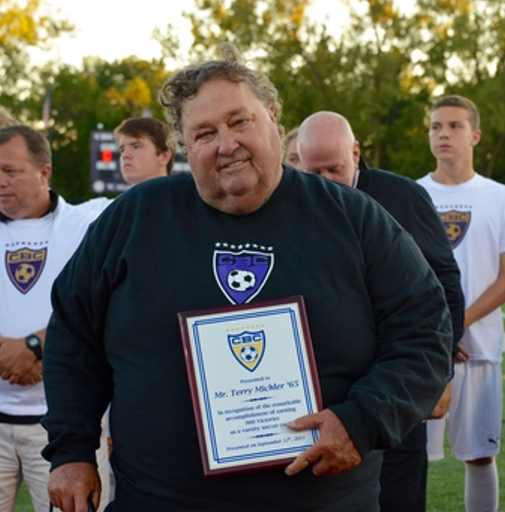
An Interview with CBC Coach Terry Michler
Christian Brothers College (CBC) Head Soccer Coach Terry Michler is one of the all-time winningest coaches in high school boys soccer history in the United States and by far, one of the most respected. In his 38 years at CBC, he has won nine state titles, been the National Coach of the Year and has been inducted into the St. Louis Soccer Hall of Fame. Being scheduled to officiate a CBC game is often an honor and a privilege, and being able to build a positive coach-official relationship with such a great mentor, is even better.
“Referee to coach communication is key,” explained Michler of what he likes in an official. “Officials who can communicate on both a verbal and non-verbal level, earn confidence and trust from coaches.”
“One of the best types of referee-coach communication is when an official makes an obvious mistake and comes to me and says, ‘hey coach, I missed that one’,” Michler noted. “The referee gives that one up, acknowledges that they made a mistake and the game goes on.”
He explained that the confident, yet humble official is the type he likes to see doing his games and that ‘referee personality’ can be obvious even before the game begins. “How I react to an official making an incorrect call starts pre-game.” He talked about a couple of referee personalities in particular, that come to his venue with smiles on their faces, looking energized, professional, confident and ready to go.
“Some referees have the same motivation as the players and I do as a coach,” he said. “They are excited to do the game, appreciate the quality of the game and as officials, contribute to that. A referee’s confidence, belief system and purpose in what they are doing often times because greater than themselves.”
When it comes to motivation, Michler is describing an intrinsically motivated referee as being the type of official he prefers. This type of official usually officiates for his love of the game, has passion for what he is doing and is having fun. Through his many years as a coach, Michler explained that he doesn’t have to wait until the game starts to see what the referee is made of. He can recognize this type of official while they are walking up to the field.
Conversely, there are officials whose main focus are extrinsic rewards, whether it be monetary or for specific accolades, these officials are there for a ‘means to an end’. While most officials are intrinsically motivated when they start officiating, often-times extrinsic factors come into play as they start to make more money and get a better level of games.
“How many games an official does in a month, week or even that day can come into play, with an officials mental and physical performance,” Michler said. “Officials owe it to the players to give it their very best effort and if an official is coming to my game after doing another game, they cannot possibly be giving 100%”.
For official’s, the way their mind and body works together is extremely important and when one is fatigued or ‘overworked’, the other has the potential for poorer performance. In the case of an official refereeing a college game, for example, prior to doing a high school game, his legs may be heavy and he may be physically fatigued prior to even arriving at the field. His mental fitness will then suffer as well, wondering things like, “I hope I can make it through this game”. In highly contested matches, such as seen at CBC, a referee may be feeling the physical fatigue from trying to make a long run and his mind starts to focus on whether or not he can physically perform, versus the game at hand. The official then finds himself out of position, missing calls and the result is issues with verbal abuse and player management.
“I think mental energy and physical energy go hand in hand. The better shape you are in, the better quality of thought and energy you will have,” Michler noted. “There is definitely a correlation with blood supply to the brain, which allows clearer thinking, followed by quicker reactions. In the end, officials who are both mentally and physically fit, process things more easily and the solutions become clearer.”
What Michler is refereeing to is the mind-body connection, which stipulates that the mind and body constantly work in conjunction with each other and what goes on in the brain has a direct impact on physical performance and vice-versa. Officials who are physically fit more consistently make better decisions when it comes to making calls and managing games.
“Some of this comes with training,” he went on. “The better shape you are in, the better quality of thought and energy you will have.” He is referring not only to officials but players as well. Players train at high level and it is important that officials do as well.
For both players and officials, physical training often becomes the priority, but there are so many other factors that can determine whether or not athletes and officials are successful on the field.
“I find that some of the problems in officiating is that the priority for officials isn’t training to have physical presence, mental fitness and communication skills, which are all huge assets in overall performance,” Michler explained. “It is important to be skilled, physically fit and know the rules, but I believe communication is the key. Commanding respect, communication skills and ‘presence’ makes all the difference.”
Having the skills to cope with stress, the confidence to deal with adversity and the motivation to ‘stay in the game’ are all very important in the world of officiating…and so is an official’s personality.
“An official’s personality on the field is often-times reflective of their real-life experience, whether it be athletics, family or even career,” Michler said. “The more positive experiences an official has, chances are their mental game is more uplifting. If an official is more negative, that will carry over to the field.”
“In athletics, only the strong survive and those that have a combination of mental and physical fitness can get to the top of that mountain!”


